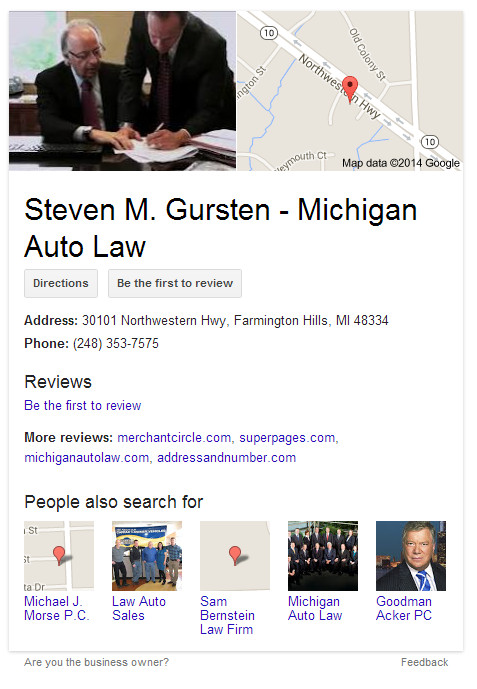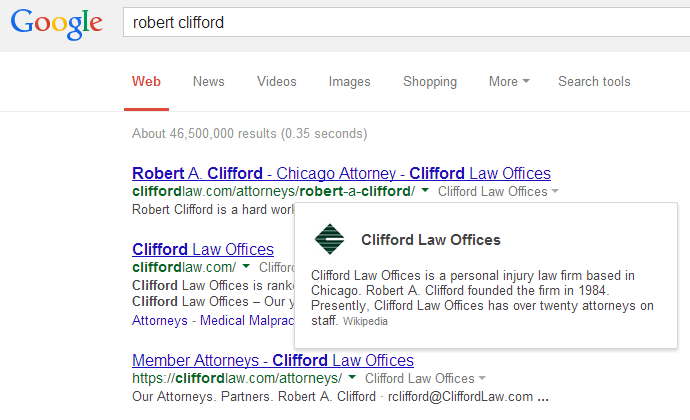The future of your law firm's search visibility won't solely be about keywords and links. It will be about how well search engines understand information about you and your business.
Back in 2012, Jack Menzel gave us one of the first looks under the hood of the true future of search:
The Knowledge Graph is a huge collection of the people, places and things in the world and how they're connected to one another:
The Knowledge Graph enables you to search for things, people or places that Google knows about—landmarks, celebrities, cities, sports teams, buildings, geographical features, movies, celestial objects, works of art and more—and instantly get information that’s relevant to your query. This is a critical first step towards building the next generation of search, which taps into the collective intelligence of the web and understands the world a bit more like people do.
The key to generating knowledge graph results is to help Google understand more information about you and your law firm. That's pretty vague, so let's talk some more specifics.
First, if you haven't already done so, you should implement both Google Authorship, Google Places (Google Plus local for business) and Publisher.
This will help generate knowledge graph results like this one:

(click here to see live result)
Dean Dowd provides a helpful post for lawyers here.
Second, you'll want to add a more data-driven approach to your law firm SEO campaigns. This includes creating entries in major public data sources like Freebase and Wikipedia.
Over at Moz, Andrew Isidoro walks us through hacking the Knowledge Graph. Krystian Szastok followed-up with a very insightful post about how it took him about a month to become an entity too. His ingredients include:
A few hours of your time - I invested about 6-8 hours
Basic coding skills - I am providing examples here
Ideally your own site/blog - can be on a free hosting
Social accounts such as Twitter, Facebook, Google+ and LinkedIn
Accounts on Wikipedia and Freebase
Most of you will likely be able to 3 out of 5 of these pretty easily. The hard parts will likely be Wikipedia and Freebase.
For example, you might not meet Wikipedia's notability standard.

Which means doing more real law firm stuff and offline SEO.
If you believe that people will continue to use search engines to find information about you in the future, then you should start paying attention to optimizing for the knowledge graph now.
There's really little doubt that this is the direction in which Google is moving.
If you think about it, it makes a lot of sense. Switching to "things" instead of "strings" is really a natural evolution. While a useful entry point to information retrieval, strings really provide a very limited understanding of the real world.
On the other hand, things can help search engines recognize many of the more nuanced attributes of, well, things. Including things like lawyers and law firms. This will allow search engines to deliver much richer and more useful SERPs.
To me, this represents the ultimate solution to webspam. It won't be the lawyers, law firms and marketers that are able to merely generate link signals. It will be those that can communicate a variety of additional real world signals (experience, leadership, service, etc) that will rise to the top of SERPs in the future. While we're not there yet, now is the time to begin to lay this foundation for your professional web presence.

Over the years, law firm prospects have sent us reports from just about all of our competitors. Unfortunately, even today, some law firm marketing agencies still mislead their clients via "reporting." One particularly egregious example comes in the form of ranking reports. Which prompted this LinkedIn post. To my surprise, I received a lot of […]
John Wanamaker supposedly said "Half the money I spend on advertising is wasted; the trouble is I don't know which half." In an an effort to figure out "what half is working," attribution was born. Coupled with a transition from traditional, offline ads to digital media, attribution became the holy grail for analyzing advertising spends. But […]
I recently asked ChatGPT, "What are some of the top personal injury law firms in Chicago?? Actually, first I ask "who are some of the top personal injury lawyers in Chicago?" ChatGPT couldn't handle that one, so I modified the prompt. ChatGPT listed five very well-known firms downtown. Can you guess the other four? That's […]
If you're like me, you have some degree of AI, ChatGBT, Bard, exhaustion. Now don't get me wrong, this is stuff is remarkable and is changing, well, a lot. But before you hook up the ChatGPT API to your WordPress API and crank out 10,000 pages, here are a few things to think about. Let's […]
If you know me, you know my opinions about links and SEO advice from Google. If you don't, here's the TL;DR: Meh, links! Meaning, all things being equal, links still remain a competitive difference maker for ranking. Take Google's SEO advice with several grains of salt. Google has no economic incentive to help your site […]
The best marketing advice I can give you is to be authentic. Of course, you don't find that very helpful in terms of meeting your growth goals. So, you might decide to game the system. As I'm writing this, one of the more popular ways to gain the system is to pay for engagement. This […]
The following post was written by ChatGPT. ChatGPT, developed by OpenAI, is a state-of-the-art language model that can generate human-like text based on a given prompt or context. This technology has the potential to revolutionize the way that businesses, including law firms, market themselves to potential clients. One way that a law firm could use […]
How long does SEO take? When can I expect to see results? What results should I expect to see? These are all reasonable questions that we field from lawyers every day. And, like many legal answers, the answer is: It depends. Yes, I know that's not the answer you wanted. But it's the most honest […]
And how much time should they spend doing it? I recently had the privilege of chatting with Tyson, Jim, and Conrad for an upcoming episode of The Maximum Lawyer Podcast. If you're not familiar with The Maximum Lawyer community, you should definitely check it out. Jim asked a really great question about who should do […]